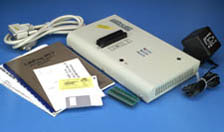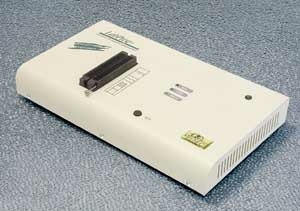LabProg+
Discontinued product. Replacement: BeeProg2 / BeeProg2C programmer.
Universal programmer.
Short description:
- 48 universal pin-drivers
- no adapter required for any DIL devices
- comfortable and easy to use control program, Windows 95/98/Me/NT/2000/XP compatible
- connection to PC - parallel (printer) port
- made in Slovakia
- warranty - 3 years
- approved by CE laboratory to meet CE requirements

Available accessories:
Features
- LabProg+ is universal programmer that supports all kinds of types and silicon technologies of programmable devices. Powerful pin-driver provides logic level, pull-up/pull-down, clock, ground, one VCC supply and two programming supply and, certainly read, on each of all 48 pins independently. This advanced design give it the ability to program almost every programmable device in DIL up to 48 pins without adapter or family-specific module. Support for todays and tomorows programmable devices gives engineers the freedom to choose the optimum device for new design.
- LabProg+ isn't only programmer, but also tester of TTL/CMOS logic ICs and memories. Furthermore, it allows to generate user-definable test pattern sequences. LabProg+ is true universal and true low-cost programmer providing the best "value for money" in today's market place.
- LabProg+ interfaces with the IBM PC 486 compatible or higher, portable or desktop personal computers. Programmers allows you to directly connect to your PC through any standard parallel (printer) port (no special interface card needed). The LabProg+ control program also supports bidirectional protocols of the PC's printer port. Consequently and due special protocol is communication between PC and LabProg+ fast and very reliable. The programming AT29C040A takes about 100 seconds
- The programmer has on-board intelligence, comprise of powerful microcontroller system and support devices. LabProg+ has been designed for multitasking operating systems and is able to perform time-critical programming sequences independently of the PC operating system status and without being interrupted by any another parallel process running on the PC. Consequently, LabProg+ works without any problem on systems running Windows 3.x, Windows 95/98 and Windows NT/2000/XP.
- The programmer performs device insertion test (wrong or backward position) and contact check (poor contact pin-to-socket) before it programs each device. These capabilities, supported by overcurrent protection and signature-byte check help prevent chip damage due to operator error.
- Built-in protection circuits eliminate damage of programmed device due to mains supply fluctuations, communication error or if PC is frozen. In event of such errors microcontroller in programmer performs, independently on the PC, exactly specified sequence of steps, so that programmed target device remains intact. Programmer's hardware offer enough resources for self-test, that control program is any time be able to check pindrivers, present and correct level of all voltages, check the timing and communication between programmer and PC.
- An optimally designed printed circuit minimizes negative programming effects at the socket (such as groundbouncing, supply voltage instability). All the inputs of the LabProg+ programmer, including the ZIF socket, connection to PC and power supply input, are protected against ESD to protect the programmer and programmed circuits against damage due ESD damage.
- LabProg+ performs programming verification at the marginal level of supply voltage, which, obviously, improves programming yield, and guarantees long data retention.
- The LabProg+ programmer is driven by an easy-to-use control program with pull-down menu, hot keys and on-line help. You can select target device by its class, by manufacturer or simply by typing a fragment of vendor name and/or part number. Besides the standard device-related commands (read, blank check, program, verify, erase) have been implemented some test functions (insertion test, signature-byte check), and some special functions (autoincrement, production mode - start immediately after insertion of chip into socket). The control program permits data manipulation within the buffer and between the buffer and files and perform automatic file format detection and conversion. The software is available in english and in more another languages.
- The software also provide a many information about programmed device. As a special, the drawing of all available packages are provided. The software provide also explanation of chip labelling (the meaning of prefixes and suffixes at the chips) for each supported chip.
- Jam files of JEDEC standard JESD-71 are interpreted by Jam Player. Jam files are generated by design software which is provided by manufacturer of respective programmable device. Chips are programmer in ZIF socket.
- The rich-featured auto-increment function of LabProg+ enables you to assign individual serial numbers to each programmed device. This function simply increments a serial number in the buffer each time a new device is inserted. Furthermore, the function enables the operator to read serial numbers and/or any programmed device identification signatures from a file.
Care for the customers
- Because the support a most of the new devices requires only a software update due to the LabProg is a universal programmer. With our prompt service you can have new device added to the list of supported devices within hours! See AlgOR (Algorithm On Request) service for details.
- Keep-Current and AlgOR services, our next step towards customer satisfaction.
- Keep-Current service means, that Elnec ships of a latest version of programmer software and and updated user documentation (Keep-Current package) to customer . A Keep-Current service is your hassle-free guarantee that you are doing the highest quality programming on Elnec programmers, at minimal cost.
- AlgOR (Algorithm On Request) service give to the user tool, with which can to influence on amount and types programmed devices as need.
- Various programming adapters are available for the LabProg+ to handle device in PLCC, SOIC, PSOP, and TSOP, TQFP and other packages. Software controlled pin-swapping capability together with universal converters are what give the LabProg+ the ability to program the target device in any package type. For example just one DIL44/PLCC44 will allow the LabProg+ to handle all devices in PLCC44 from current device list. The majority of devices with more as 48 pin can be programmed through an adapter with simple pin interconnection only.
- It is important to remember that in most cases new devices require only a software update since the LabProg+ has 48 true pin drivers, which can perform as required under program control. With our prompt service new device can be added to the current list of supported devices within hours!
- Advanced design of the LabProg+ programmer, including protective circuits, original brand components, and careful manufacturing and burning allows us to provide a three-year warranty on parts and labor for the programmer (limited 25 000-cycle warranty on ZIF socket).
Hardware specification
Socket, pin drivers and DACs
- 48-pin DIL ZIF (Zero Insertion Force) socket accepts both 300/600 mil devices up to 48-pin
- Three D/A converters for VCCP, VPP1, and VPP2, with controllable rise and fall time and current limitation
- TTL driver provides H, L, CLK, pull-up, pull-down on all 48 pins
- full support of Low Voltage circuits from 1.8 V up
- autocalibration
Software specification
Device operations
- standard:
- automatic ID-based selection of EPROM/Flash EPROM
- blank check
- read
- program
- verify
- erase
- configuration and security bit program
- checksum
- interprete the Jam Standard Test and Programming Language (STAPL), JEDEC standard JESD-71
- security:
- insertion test
- contact check
- ID byte check
- special:
- production mode (automatic start immediately after device insertion)
- auto device serial number increment
- statistic
- count-down mode
Buffer operations
- view/edit, find/replace
- fill/copy, move, byte swap, word/dword split
- checksum (byte, word)
Supported file formats
- unformatted (raw) binary
- HEX: Intel, Intel EXT, Motorola S, MOS, Exormax, Tektronix, ASCII-SPACE-HEX
- POF (Altera), JEDEC (ver. 3.0.A), eg. from ABEL, CUPL, PALASM, TANGO PLD, OrCAD PLD, PLD Designer ISDATA, etc.
- JAM (JEDEC STAPL Format), JBC (Jam STAPL Byte Code), STAPL (STAPL File) JEDEC standard JESD-71
Device support
Programmer:
- EPROM: NMOS/CMOS, 1702*, 2708*, 27xxx and 27Cxxx series, with 8/16 bit data width, full support for LV series
- EEPROM: NMOS/CMOS, 28xxx, 28Cxxx, 27EExxx series, with 8/16 bit data width
- Flash EPROM: 28Fxxx, 29Cxxx, 29Fxxx, 29BVxxx, 29LVxxx, 29Wxxx, 49Fxxx series, from 256Kbit to 32Mbit, with 8/16 bit data width, full support for LV series
- Serial E(E)PROM: 24Cxxx, 24Fxxx, 25Cxxx, 45Dxxx, 59Cxxx, 25Fxxx, 25Pxxx, 85xxx, 93Cxxx, NVM3060, MDAxxx series, full support for LV series
- Configuration (EE)PROM: XCFxxx, XC17xxxx, XC18Vxxx, EPCxxx, AT17xxx, 37LVxx
- PROM: AMD, Harris, National, Philips, Signetics, Tesla, TI
- NV RAM: Dallas DSxxx, SGS/Inmos MKxxx, SIMTEK STKxxx, XICOR 2xxx, ZMD U63x series
- PLD: Altera: MAX 3000A, MAX 7000A, MAX 7000B, MAX 7000S, MAX7000AE
- PLD: Lattice: ispGAL22V10x, ispLSI1xxx, ispLSI1xxxEA, ispLSI2xxx, ispLSI2xxxA, ispLSI2xxxE, ispLSI2xxxV, ispLSI2xxxVE, M4-xx/xx, M4A3-xx/xx, M4A5-xx/xx, M4LV-xx/xx
- PLD: Xilinx: XC9500, XC9500XL, XC9500XV, CoolRunner XPLA3, CoolRunner-II
- other PLD: SPLD/CPLD series: AMI, Atmel, AMD-Vantis, Gould, Cypress, ICT, Lattice, NS, Philips, STM, VLSI, TI
- Microcontrollers 48 series: 87x41, 87x42, 87x48, 87x49, 87x50 series
- Microcontrollers 51 series: 87xx, 87Cxxx, 87LVxx, 89Cxxx, 89Sxxx, 89LVxxx, all manufacturers, Philips 87C748..752 series, Philips LPC series, Cygnal/Silicon Laborat. C8051 series
- Microcontrollers Intel 196 series: 87C196 KB/KC/KD/KT/KR/...
- Microcontrollers Atmel AVR: AT90Sxxxx, ATtiny series
- Microcontrollers ELAN: EM78Pxxx
- Microcontrollers Microchip PICmicro: PIC10xxx, PIC12Cxxx, PIC16C5x, PIC16Cxxx, PIC17Cxxx, PIC18Cxxx, dsPIC series
- Microcontrollers Motorola: 68HC11 series (1)
- Microcontrollers National: COP8xxx series
- Microcontrollers NEC: uPD78Pxxx series
- Microcontrollers Scenix (Ubicom): SXxxx series
- Microcontrollers SGS-Thomson: ST6xx series
- Microcontrollers TI: MSP430 series
- Microcontrollers ZILOG: Z86xxx series
- Microcontrollers other: Cypress, EM Microelectronic, Fujitsu, Goal Semiconductor, Princeton, Macronix, Winbond, Hitachi, Holtek, Infineon(Siemens), NEC, Samsung, Toshiba, ...
Notes:
- (1) due to special programming procedures of Motorola microcontrollers, the LabProg+ programmer is not capable to support other Motorola microcontrollers, than currently supported. If you have to program other Motorola microcontrollers, think please about FPGA based programmer (BeeProg, JetProg)
- devices marked * are obsolete, programming with additional module
- the LabProg+ programmer is NOT INTEDED to be a ISP programmer. If you think about ISP, use please the programmers, equipped by ISP connector (SmartProg, BeeProg, ...)
I.C. Tester:
- TTL type: 54,74 S/LS/ALS/H/HC/HCT series
- CMOS type: 4000, 4500 series
- Static RAM: 6116 .. 624000
- User definable test pattern generation
Package support:
- package support includes DIP, PLCC, SOIC, PSOP, SSOP, TSOP, TSSOP, TQFP, QFN (MLF), SDIP, BGA and other
- support all devices in DIP with default socket
- support devices in PLCC28, PLCC32 and PLCC44 with universal adapter
- compatible with third-party adapters for non-DIP support
Programming speed
Note: The programming times of the programmer, attached to PC through LPT port, depends a bit on PC speed, LPT port type and operating system free resources. Look at Elnec programmers, tips to increase of programming speed application note for details.
If you plan to use a high-capacity memories, please accept a relative long programming time or think please about much more powerful BeeProg or JetProg programmer.
| Device | Operation | Time | ||
|---|---|---|---|---|
| 27C010 | programming and verify | 39 sec. | ||
| AT29C040A | programming and verify | 75 sec. | ||
| AM29F040 | programming and verify | 165 sec. | ||
| PIC16C67 | programming and verify | 30 sec. | ||
| Conditions: P4, 2.4 GHz, ECP, Windows XP. | ||||
General
- Programmer hardware related requirements:
- one (parallel) printer port with nothing attached, the bidirectional printer port (PS/2) on PCI bus recommended
General
- operating voltage 12..15V AC, max. 1A or 15V-18V DC, max. 1A
- power consumption max. 12W active, about 1.5W sleep
- dimensions 275x157x47 mm (10.8x6.2x1.9 inch)
- weight (without external adapter) 1.5kg (3.3069 lb)
- temperature 5°C ÷ 40°C (41°F ÷ 104°F)
- humidity 20%..80%, non condensing

Package includes
- LabProg+ programmer
- switching power adapter 100..240V AC/15V DC/1A
- connection cable PC-programmer
- diagnostic POD for selftest of the programmer
- anti-dust cover to ZIF socket
- user manual (on CD)
- software
- registration card
- transport case
Additional services
- Keep Current - Elnec sends to user the latest version of programmer software and updated user documentation (Keep-Current package)
- AlgOR (Algorithms On Request) - add new supported devices on customer request
Programmer price also includes
- free technical support (WebForm/e-mail based)
- free life-time software update via Internet
The information in this document is subject to change without notice.



